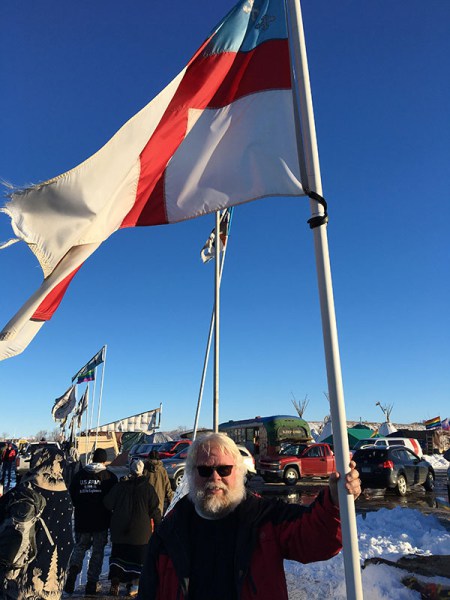Presiding Bishop Michael Curry has issued a statement celebrating and commending the decision of the US Army Corp of Engineers to deny an easement allowing the Dakota Access Pipeline to continue construction on its currently proposed course, which would cross waters that supply the Standing Rock Sioux Nation.
On behalf of the Episcopal Church, I offer my gratitude to President Barack Obama and his Administration for championing the rights of the indigenous peoples of the United States. We applaud the decision by the U.S. Army Corps of Engineers to deny the pipeline permit under Lake Oahe. I personally offer thanks to all those who have worked to amplify the voices of the people at Standing Rock, calling our attention to historic wrongs and injustices, and urging us all to consider a new vision for how we might love God, love each other, and love the earth.
I am grateful and humbled by the water protectors of Standing Rock, whose faithful witness serves as an example of moral courage, spiritual integrity, and genuine concern for the entire human family and God’s creation. I am equally appreciative of the sacrifice and example of the military veterans, interfaith clergy, and trauma chaplains who accompanied the water protectors during critical moments of the struggle, many of whom have pledged to remain as long as the water protectors are present.
Our whole Church should offer special thanksgiving to Father John Floberg of the Diocese of North Dakota, who so effectively organized Episcopalians and other people of faith in this effort, and to clergy and lay people who committed themselves to standing with the water protectors – both physically and in spirit.
Curry said that we must also look ahead: challenges remain, and a new route may be found to raise the same concerns. Already, the company that owns the pipeline project has signaled their intention to challenge the decision of the Engineers.
The Episcopal News Service reported that, in the meantime, the water protectors will remain in place.
“People will not leave until this situation is secure and that the victory that was won yesterday is sustained, and we have confidence that it will be sustained even into a new presidential administration,” said [the Rev. John] Floberg in a Dec. 5 telephone interview with Episcopal News Service. “Will some people go home? Yes, there can be a large stand down right now, but there will be a significant presence maintained, that will call back this force of people from throughout this country and around the world if this course is not maintained.” …
Thirty chaplains, including Episcopalians, Unitarians, Quakers, hospital and prison chaplains, are spending their days in camp through Dec. 7, while sleeping on the floor of St. James’ Episcopal Church in nearby Cannon Ball. …
The Episcopal Church has supported water protectors and their allies since August when opposition to the Dakota Access Pipeline began in earnest. And the support will continue, said Floberg.
The Church will continue to provide support comfort and pastoral care to people on the ground, and Floberg is encouraging Episcopalians to continue to come to Standing Rock in a show of solidarity; yesterday as the announcement was made, a group from Rochester, New York, was making its way.
“What we are doing is we are staying where the people are, that is where the Church belongs, among the people, and we continue to call for Episcopalians and clergy to come and bear witness here. We’re not calling for people to turn around.”
Read the Presiding Bishop’s statement on yesterday’s decision here; the Episcopal News Service here; more coverage from the Cafe, including the statement of Energy Transfer Partners challenging the Army Engineers’ decision here.
Photo: The Rev. John Floberg, supervising priest of the Episcopal churches on the North Dakota side of Standing Rock, standing with the Episcopal flag in Oceti Sakowin Camp on Dec. 4. Lauren Stanley, Episcopal News Service

